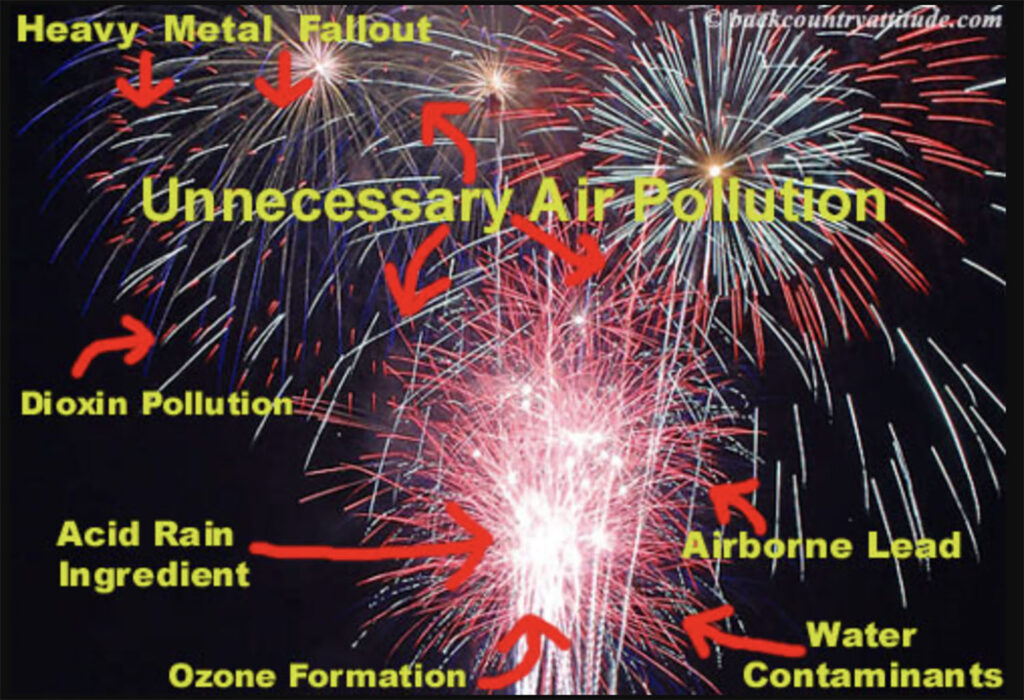By Bella Isaacson, Alliance Intern from Scripps College
While fireworks are associated with July Fourth, they actually trigger a wide number of challenges for people, animals and the environment. On top of the 16,000 organized firework shows according to Parade, there are hundreds of thousands of fireworks being set off at all times of the day and night for the week before and after. These cause serious distress for babies, veterans suffering from PTSD, dogs and wildlife, among others. Most people don’t realize there is an unseen show at play, going on for days after the sparks have fallen from the sky.
Wildlife
The initial shock of fireworks can wreak havoc on animal populations, causing them to flee – sometimes ending up in dangerous urban areas, or leaving nests unattended and at risk. Debris from fireworks also poses a threat, contaminating habitats with the potential to become choking hazards, says the US Fish and Wildlife Service. A recent study exposed the harsh ecological toll that fireworks have on wildlife. In California, July 4th fireworks have directly contributed to the decline of colonies of Brandt’s cormorants.
“The annual timing of some large-scale firework events coincides with the migratory or reproductive movements of wildlife, and may therefore have adverse long-term population effects on them,” says lead author Associate Professor Bill Bateman.
Toxic chemicals, heavy metals and essential minerals
In addition to these highly destructive effects, toxic materials used to make fireworks result in pollutants such as sulfur dioxide and particulate matter being released into the atmosphere with each bang. These pollutants make their way into the soil and water, posing further risks to human and animal health.
Backcountry Attitude cited a case study that showed “within 1 hour of fireworks displays levels of Strontium in the air increased 120 times, Magnesium 22 times, Barium 12 times, Potassium 11 times, and Copper 6 times more than the amount present in the air before the event. Another study found that firework events brought air pollution spikes in suspended particles (nitric oxide and sulfur dioxide) and created and dispersed an aerosol cloud hosting a range of metallic elements.”
Fires
As our country experiences widespread drought, it’s also important to remember the fire hazard that fireworks pose. “Fireworks started an estimated 32,300 reported fires per year, including 2,700 building and vehicle fires. More fires are reported on the 4th of July than any other day of the year,” according to Backcountry Attitude.
Health risks
Using risk data from epidemiological studies conducted in USA, it was estimated “that when exposed to air pollution from fireworks the relative risk of cardiovascular mortality would increase as high as 125.11% and the relative risk for cardiovascular morbidity was found to increase 175.16% over a regular winter day,” according to Backcountry Attitude.
Noise and hearing damage
Fireworks can exceed 140 decibels and noise at 85 decibels or above can damage hearing, according to Backcountry Attitude.
The future of fireworks
The place that fireworks have in Fourth of July celebrations seems increasingly uncertain, with the effects more perilous than pragmatic. Community celebrations can adapt to become more sustainable and equitable. Bateman asserts that “The future of firework displays may be in the use of safer and greener alternatives such as drones, eco-friendly fireworks or visible-wavelength lasers for light shows.”
When celebration comes at the expense of ecological health and safety, it is important to think about how you may be able to adapt tradition for more respectful, ecologically responsible festivities.

